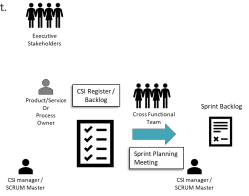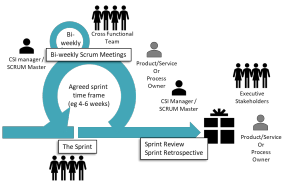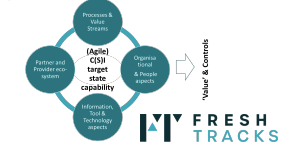Agile Continual Service Improvement – facilitating rapid innovation and value
The reality is that implementing and sustaining continual service improvement (CSI) in organisations often fails to deliver outcomes and value. There are many reasons for this, including: not the right culture; takes too long; too many frameworks to choose from that all seem overly complicated; no one willing to be accountable for improvement initiatives; enthusiasm wanes; business as usual trumps CSI each time; CSI registers often end up containing massive improvement ideas that would take many months to implement; this list goes on. As a result of these challenges, many organisations have given up or the CSI process has become tokenism to tick a box. It is no wonder that process owners/managers often implement actual improvements ‘under the radar’ and see a CSI process as introducing extra work and no value. Here at Fresh Tracks we have experienced all of these challenges firsthand. Based on lessons learnt, we have created our Agile CSI framework.
How does it work?
Leveraging both DOI’s ‘Agile Service Management’ and ITIL4’s Continual Improvement Model, our Agile CSI framework facilitates rigor and progress to see initiatives through to value realisation.
- The CSI register (also called the CSI backlog) is prioritised with initiatives being run as sprints.
- Improvement initiatives are broken down into manageable pieces that are implemented through sprints (typically 4 weeks)
- Cross functional team members genuinely commit to dedicate time to achieve the agreed outcome, yet this is a reasonable amount of time that can be included in people’s weekly schedules. They see the process as a vehicle to achieve the improvements that they envision and finally there’s integration of the CSI process in their daily practice rather than seeing it as a separate function and separate workload.
- User Stories are created to bring life to the innovation as well as ensuring the intent is well understood by all parties.
- Agreed acceptance criteria are set for each initiative with a clear pass/fail result.
Key roles
CSI Scrum Master – ensure the team embraces and masters scrum practices as well as enabling an optimal environment by removing impediments where required. Our CSI scrum masters also master IT Service Management, SIAM and DevOps and are able to add further value in facilitating effective and efficient improvement initiatives.
Process/Service Owner (of processes/services that are improved) – the equivalent of the ‘product owner’ role in classic SCRUM practices, accountable for the improvement initiative and driving the desired outcome. Each process or service owner continually ‘grooms’ their section of the CSI backlog and provides the cross functional team that works on their CSI initiatives with priorities on ‘what’ they need to work on
Development Team – cross functional stakeholders in the process or service that is being improved, directly involved in ‘pulling’ user stories from the CSI backlog, planning to deliver the requirements in sprints, estimating, organising and doing the work.


It works…..
Fresh Tracks has helped several Federal Government Departments; Telco and Managed Service Providers with the establishment of an Agile CSI capability, where each process owner and manager of ITSM processes groom their backlog and there is a consistent cadence of parallel sprints to improve prioritised aspects of selected processes at any point in time. CSI status reports demonstrate velocity, quality of CSI initiatives and – most importantly – actual benefits realisation after completion of the initiatives.
Fresh Track customers tell us that our Consultants are able to ‘make agile real’ and genuinely coach people in effectively applying agile practices, resulting in actual outcomes, benefits and job satisfaction.
Holistic understanding of your destination
The Fresh Tracks CSI Agile framework takes a holistic view of continual improvement to enable a balance of Value & Controls.

